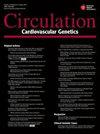遗传性血栓病和传统心血管危险因素对动脉血栓栓塞风险的相互作用:四个家庭队列研究的汇总分析
Q Medicine
引用次数: 19
摘要
背景:遗传性血栓病与动脉血栓栓塞(ATE)风险的轻微增加有关。遗传性血栓性疾病是否与传统心血管危险因素相互作用影响ATE的风险尚未确定。方法与结果:来自荷兰的4个家庭队列共1891人被纳入分析。评估五种遗传性血栓性缺陷,包括V Leiden因子、凝血酶原G20210A缺陷和天然抗凝剂(即抗凝血酶、蛋白C和蛋白S)缺乏,并收集危险因素和既往ATE数据。血栓形成与ATE风险升高相关(风险比=1.74,95%可信区间,1.18-2.58;P = 0.005)。总的来说,在存在传统心血管危险因素的情况下,血栓形成与ATE的相关性往往更强,尤其是血栓形成与糖尿病的协同作用是惊人的(血栓形成与ATE关联的风险比在非糖尿病患者中为1.41,在糖尿病患者中为8.11)。此外,与男性和55岁以下的个体相比,血栓形成与ATE的相关性在女性和55岁之前更强。结论:血栓形成与ATE相关。在存在传统心血管危险因素的情况下,特别是在糖尿病患者中,这种关联可能更强。未来对血栓形成- ate风险的研究应关注传统心血管危险因素高发的高危人群。本文章由计算机程序翻译,如有差异,请以英文原文为准。
Interaction of Hereditary Thrombophilia and Traditional Cardiovascular Risk Factors on the Risk of Arterial Thromboembolism: Pooled Analysis of Four Family Cohort Studies
Background—Hereditary thrombophilia is associated with a slightly increased risk of arterial thromboembolism (ATE). Whether hereditary thrombophilia interacts with traditional cardiovascular risk factors on the risk of ATE has yet to be established. Methods and Results—A total of 1891 individuals belonging to 4 family cohorts from the Netherlands were included in the analyses. Five hereditary thrombophilic defects, including factor V Leiden, prothrombin G20210A defect, and deficiencies of the natural anticoagulants (ie, antithrombin, protein C, and protein S), were assessed, and data on risk factors and previous ATE were collected. Thrombophilia was associated with elevated risk of ATE (hazard ratio =1.74, 95% confidence interval, 1.18–2.58; P=0.005). Overall, the association of thrombophilia with ATE tended to be stronger in the presence of traditional cardiovascular risk factors, especially the synergistic effect of thrombophilia with diabetes mellitus was striking (hazard ratio of thrombophilia–ATE association was 1.41 in nondiabetics versus 8.11 in diabetics). Moreover, the association of thrombophilia with ATE tended to be stronger in females and before the age of 55 years as compared with males and individuals >55 years of age, respectively. Conclusions—Thrombophilia is associated with ATE. This association may be stronger in the presence of traditional cardiovascular risk factors in particular in individuals with diabetes mellitus. Future studies on thrombophilia–ATE risk should focus on high-risk populations with high prevalence of traditional cardiovascular risk factors.
求助全文
通过发布文献求助,成功后即可免费获取论文全文。
去求助
来源期刊

Circulation-Cardiovascular Genetics
CARDIAC & CARDIOVASCULAR SYSTEMS-GENETICS & HEREDITY
CiteScore
3.95
自引率
0.00%
发文量
0
期刊介绍:
Circulation: Genomic and Precision Medicine considers all types of original research articles, including studies conducted in human subjects, laboratory animals, in vitro, and in silico. Articles may include investigations of: clinical genetics as applied to the diagnosis and management of monogenic or oligogenic cardiovascular disorders; the molecular basis of complex cardiovascular disorders, including genome-wide association studies, exome and genome sequencing-based association studies, coding variant association studies, genetic linkage studies, epigenomics, transcriptomics, proteomics, metabolomics, and metagenomics; integration of electronic health record data or patient-generated data with any of the aforementioned approaches, including phenome-wide association studies, or with environmental or lifestyle factors; pharmacogenomics; regulation of gene expression; gene therapy and therapeutic genomic editing; systems biology approaches to the diagnosis and management of cardiovascular disorders; novel methods to perform any of the aforementioned studies; and novel applications of precision medicine. Above all, we seek studies with relevance to human cardiovascular biology and disease. Manuscripts are examined by the editorial staff and usually evaluated by expert reviewers assigned by the editors. Both clinical and basic articles will also be subject to statistical review, when appropriate. Provisional or final acceptance is based on originality, scientific content, and topical balance of the journal. Decisions are communicated by email, generally within six weeks. The editors will not discuss a decision about a manuscript over the phone. All rebuttals must be submitted in writing to the editorial office.
 求助内容:
求助内容: 应助结果提醒方式:
应助结果提醒方式:


